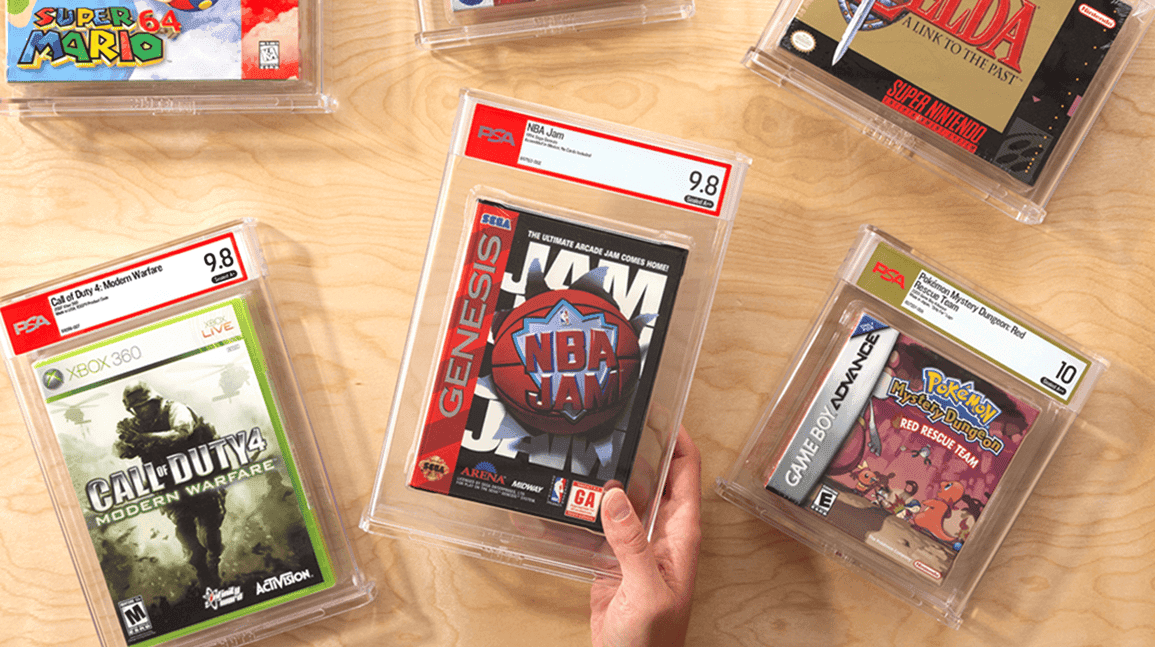More than four years after being acquired by Collectors Universe, Wata Games is finally right where it expected to be — officially under the PSA banner, both in name and label.
Wata officially rebranded as PSA on Oct. 20, completing a multi-year quest that some, both internally and externally, expected sooner. But rather than force through an immediate rebrand for Collectors’ first major category expansion beyond cards, coins and sports memorabilia, Wata remained a standalone brand following its acquisition, and now delivers a critical update as the appetite for pop-culture collectibles appears to be bigger than ever.
Founded by Deniz Kahn in 2017, Wata had already established a loyal customer base when it was acquired by PSA parent company Collectors Universe, and keeping the trust of those submitters was a key variable for the timeline.
“This was something that we kind of always wanted to do, but we wanted to do it right, and that meant doing right by our customers and making them feel they could trust Collectors and what it meant to be part of the PSA brand,” Claire Shelton, head of PSA video games, told cllct. “I think a necessary part of this was Wata existing for a meaningful amount of time under Collectors, because if they had acquired Wata, and six months later, one year later, switched over to PSA, people would have had no idea what to expect when it came to grading standards, processes or even point of contact. We needed to build trust for how Collectors handled Wata.”
The wait appears to have worked. According to PSA’s general manager of pop culture Elizabeth Gruene, Wata has been tracking to grow 30% year-over-year in 2025. The company has also been the holder of choice for many of the top-selling video games of all time, including the record $2 million paid for a 1985 NES Super Mario Bros. in August 2021.
PSA expects its media grading business to continue to grow with the rebrand, and a major reason will be brand continuity. In addition to a preference among hobbyists to have their collectibles holdered by the same company with similar labels, the rebrand connects the businesses in a way most collectors simply didn't realize before.
According to Shelton and Gruene, few Wata or PSA customers — sometimes even customers of both companies — realized Wata was under the Collectors umbrella, let alone shares team members, facilities and resources with PSA.
Media authenticated by PSA, which includes video games, DVDs, Blu-rays and CDs, will utilize the lineup of holders originally designed by Wata but feature labels inspired by PSA’s new comic book and magazines category.
The rebrand also expects to bring features from other categories into the media vertical. An add-on under Wata, post-grading photographs for the front of each collectible — something collectors have expected for cards, comics and other categories — will now be included. Wata previously offered PSA/DNA autograph authentication, and PSA expects to add Dual Service grading for media.
In total, the transformation of Wata has taken more than two years of planning and execution and been more difficult than expected.
A full rebrand required an updated marketing strategy, new plans for social-media accounts, new labels for the holders, new legal trademarks and significant updates to the population report and the old Wata website.
Updating Wata’s website while remaining intuitive for current customers ended up being particularly time consuming from an engineering perspective, and according to Shelton, required the company to more or less rip the website down to its studs and rebuild. It was important, however, to ensure customers could still access their order history and scans dating back to Wata’s earliest submissions.
“In a lot of ways, we discovered that it’s a bit harder to rebrand something than it is to start from scratch, because we had all of this existing infrastructure and a customer base to support,” Shelton said. “It presented really unique challenges that were not something you’d experience with a new business line being built from the ground up.”
Wata’s rebrand to PSA arrives at a critical moment for pop-culture collectibles in particular. The Pokémon trading card market has been the most explosive category in recent months — GemRate confirmed to cllct that PSA has graded more than 8.67 million TCG cards so far in 2025, compared to 6.43 million sports cards.
PSA has aggressively tried to expand its footprint among pop-culture collectors alongside that growth, and counts its entrance into comics and magazine grading as a recent highlight. Partnerships with eBay and GameStop for submissions and more frequent dropoff events at local card shops or shows has also better connected PSA with customers that might not have graded their cards otherwise.
PSA’s media and video game grading business will eventually be pulled into those growth efforts and expects to benefit more than it could as a standalone company.
“Things are really booming, and these businesses are all growing like crazy and seeing great returns,” Gruene said. “We definitely are not taking our foot off the gas pedal, we’re really focused on continuing to grow these businesses.
“I think it's a perfect moment, because a lot of the people who grew up with Pokémon, playing these games on their GameBoy, or grew up with these comics and magazines as a kid are getting to the age where they are collecting and investing in these areas. So it’s the perfect time to be kind of doubling down and focusing on these categories.”
Ben Burrows is a reporter and editor for cllct, the premier company for collectible culture. He was previously the Collectibles Editor at Sports Illustrated. You can follow him on X and Instagram @benmburrows.

